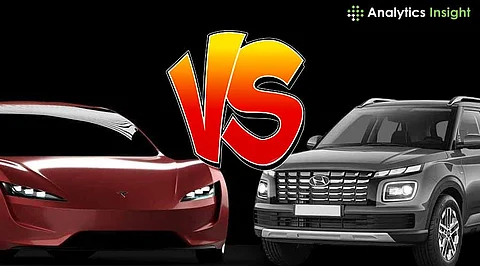

The electric vehicle (EV) industry is at the forefront of global innovation, with Tesla and Hyundai competing to lead the race. Both automakers are pioneering advanced EV technologies, catering to growing consumer demand for sustainable and efficient vehicles. In 2025, their rivalry intensifies as they introduce new models, explore emerging markets, and innovate in autonomous driving and battery technologies.
Tesla, led by its visionary CEO, remains a dominant force in the EV market. With a global EV market share of over 15%, Tesla is the world's largest EV maker. In 2024, Tesla delivered over 2.1 million vehicles globally, a 30% increase compared to 2023, despite supply chain challenges. The company's Model Y remained the best-selling EV worldwide, while the Cybertruck's debut marked a major milestone.
Tesla's latest Model 3 Highland, released in late 2024, brings significant updates, including enhanced range and a refreshed design. The Cybertruck began deliveries in December 2024, with over 500,000 preorders globally. It boasts impressive specs, including a range of 500 miles, innovative steel exoskeleton design, and advanced autonomous capabilities.
Tesla's Full Self-Driving (FSD) software continues to evolve. The recent FSD Beta 12 update utilizes Tesla's Dojo supercomputer for real-time learning, providing enhanced safety and smoother autonomous navigation. Tesla’s proprietary 4680 battery cells offer improved energy density and cost efficiency, solidifying its leadership in battery technology.
Tesla’s Gigafactories in Texas, Berlin, and Shanghai continue to ramp up production, targeting an annual capacity of 4 million vehicles by 2026. Tesla is also eyeing India as a major market, with plans to establish a manufacturing facility and cater to the growing demand for EVs in Asia.
Hyundai has positioned itself as a strong competitor to Tesla, focusing on affordability, innovation, and sustainability. Hyundai Motor Group, which includes Kia and Genesis, sold over 1.4 million EVs globally in 2024, making it the second-largest EV manufacturer. Hyundai's Ioniq series and Kia EV models have gained significant traction in Europe, North America, and Asia.
Hyundai launched the Ioniq 7 SUV in late 2024, featuring a spacious design, advanced autonomous capabilities, and a range of 350 miles. The model targets family-oriented consumers seeking a premium yet affordable EV. Additionally, Kia unveiled the EV5, designed for urban commuters, with advanced features at a competitive price point.
Hyundai's E-GMP (Electric-Global Modular Platform) underpins its EV lineup, enabling ultra-fast charging (80% in 18 minutes) and long-range capabilities. Hyundai’s partnership with LG Energy Solutions has accelerated the development of solid-state batteries, expected to debut in Hyundai models by 2026.
Hyundai is aggressively expanding its EV presence in India, Southeast Asia, and Latin America, targeting price-sensitive markets with affordable models like the Kona Electric and Ioniq 5. Hyundai's manufacturing facility in Indonesia, established in 2023, is playing a pivotal role in catering to the Asian market.
Tesla leads with a global EV market share of 15%, while Hyundai Motor Group holds a significant 10%. Tesla’s dominance is driven by its stronghold in the US and Europe, while Hyundai has gained popularity in Asia and emerging markets.
Tesla’s lineup includes premium EVs such as the Model S, Model X, Model Y, and the affordable Model 3. Hyundai, on the other hand, offers a diverse range of EVs, catering to different segments. Its Ioniq series targets families and urban consumers, while the Genesis luxury brand competes with Tesla’s premium models.
Tesla excels in autonomous driving with its FSD software, powered by its in-house AI systems and supercomputers. Hyundai focuses on affordability and practical innovations, such as ultra-fast charging and efficient modular platforms. While Tesla leads in battery innovation with its 4680 cells, Hyundai is making strides in solid-state battery research.
Tesla's vertically integrated production model ensures control over supply chains, reducing reliance on external suppliers. Hyundai, however, benefits from its established global manufacturing footprint, enabling faster market penetration and cost advantages.
The global EV market was valued at $250 billion in 2024 and is projected to reach $1 trillion by 2030, growing at a compound annual growth rate (CAGR) of 25%. Governments worldwide are pushing for electrification, with incentives for EV adoption and stricter emissions regulations.
In the US, Tesla continues to dominate with a 60% market share in EV sales. Hyundai, however, is gaining traction with the Ioniq 5 and Kia EV6, supported by competitive pricing and growing brand recognition.
Europe remains a crucial battleground, with countries like Norway and Germany leading EV adoption. Tesla’s Model Y was the best-selling car in Europe in 2024, but Hyundai is closing the gap with its Ioniq 5 and 6, which offer affordability and performance.
Asia represents the largest growth opportunity for EV makers. Tesla’s entry into India and Hyundai’s dominance in South Korea and Southeast Asia highlight the region’s importance. Both companies are investing in local manufacturing to capture market share in price-sensitive countries.
Both Tesla and Hyundai face stiff competition from Chinese automakers such as BYD and NIO, which offer affordable EVs with advanced features. European brands like Volkswagen and BMW are also intensifying their EV efforts, further crowding the market.
Global supply chain disruptions and rising costs of raw materials, such as lithium, cobalt, and nickel, pose challenges for both Tesla and Hyundai. These constraints may impact production and pricing strategies in the coming years.
While governments are promoting EV adoption, evolving regulations and tariff policies, such as those introduced by the Trump administration, may create uncertainties for automakers.
Tesla and Hyundai are poised to remain at the forefront of the EV revolution. Tesla’s focus on premium innovation, autonomous driving, and battery technology will likely sustain its leadership. Meanwhile, Hyundai’s strategy of affordability, modular platforms, and diverse product offerings will enable it to capture a broader consumer base.
The rivalry between Tesla and Hyundai exemplifies the dynamic nature of the EV industry. As both automakers continue to innovate and expand, consumers stand to benefit from a wider range of choices, better technology, and improved sustainability. The future of EVs will undoubtedly be shaped by their relentless pursuit of excellence.
